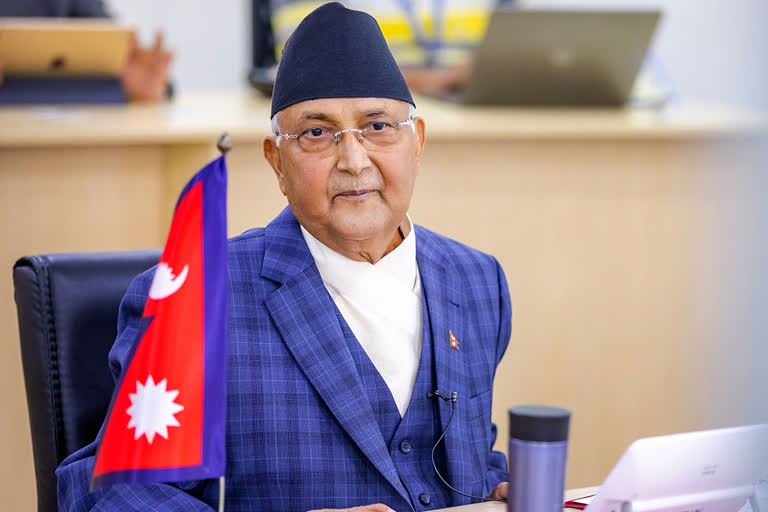Kathmandu: K P Sharma Oli, in his capacity as leader of the largest political party in Nepal's Parliament, was reappointed as Prime Minister on Thursday night after the Opposition parties, riddled by factionalism, failed to secure majority seats to form a new government.
President Bidya Devi Bhandari reappointed CPN-UML Chairman Oli, 69, as Prime Minister, three days after he lost a crucial trust vote in the House of Representatives.
The Office of President in a press statement on Thursday evening said that President Bhandari reappointed Oli as Prime Minister in his capacity as leader of the largest political party in the House of Representatives as per Article 78(3) of the Constitution of Nepal.
President Bhandari will administer the oath of office and secrecy to Oli at a ceremony at Shital Niwas on Friday.
The president had asked the Opposition parties to come up with the support of majority lawmakers to form a new government by 9 pm Thursday after Oli, lost the vote of confidence in the House on Monday.
Oli's appointment came shortly after the Office of President said that no two parties or more than two parties came to lay claim to forming a coalition government by the given deadline that expired at 9 PM.
Oli will now have to take a vote of confidence at the House within 30 days, failing which, an attempt to form a government under Article 76 (5) would be initiated. Should both the steps fail, the House may face another dissolution and the country will move towards the direction of early elections.
Political parties were engaged in hectic negotiations to form a coalition government under Article 76 (2) for the past three days but failed to bear any fruit.
Until Thursday, the Nepali Congress president, who got backing from CPN-Maoist Centre chairman Pushpakamal Dahal "Prachanda" was hopeful to get sufficient votes in the House to stake his claim as the next Prime Minister.
But as Madhav Kumar Nepal took a U-turn after his last-minute meeting with Oli, Deuba's dream to become the next Prime Minister was shattered.
The dissident faction led by Madhav Nepal within the CPN-UML, with their 28-member strength in Parliament had earlier decided to resign en masse from the Parliament paving way for Deuba to claim for the post of Prime Minister.
On the other hand, Janata Samajwadi Party was also divided on the issue of extending support to Deuba as the next Prime Minister.
Upendra Yadav, President of JSP had assured Deuba to extend support, but Mahanta Thakur, another president of the party, who has backing from 17 out of 32 Lawmakers, rejected Upendra's idea.
The CPN-UMl, headed by Oli is the largest party with 121 seats in the House of Representatives. However, Oli, needs to prove the majority through a vote of trust in the Parliament within a month of his re-appointment.
Nepali Congress and Maoist Centre have 61 and 49 seats in the lower house. Their combined strength was 110, which is insufficient to win a majority vote.
At present 136 votes are needed to form a majority government.
Oli withdrew the action taken against four UML leaders including Nepal and assured to address their other demands. If 28 UML MPs had resigned, the total strength of the House would have been reduced to 243. Currently, there are 271 valid members in the House. If they had resigned only 122 votes would be sufficient to stake a claim for a majority government.
Earlier, Baburam Bhattarai, a senior leader of JSP-N, said all parties needed to form a new national coalition government and hold elections in one year.
Bhattarai said such a government should not be led by a former prime minister or the current prime minister.
Bhattarai said such a government should be run based on a common minimum programme, should resolve the COVID crisis, and ensure economic relief packages, constitution amendment, and truth and reconciliation.
Given the parties' strengths and particularly the factional feuds in the CPN-UML and the Janata Samajbadi, many say the current numbers game is just a futile exercise and that the country, which has had eight different governments in a decade, would sooner or later head towards early polls, the Kathmandu Post reported.
Nepal plunged into a political crisis on December 20 last year after President Bhandari dissolved the House and announced fresh elections on April 30 and May 10 at the recommendation of Prime Minister Oli, amidst a tussle for power within the ruling Nepal Communist Party (NCP).
Oli's move to dissolve the House sparked protests from a large section of the NCP led by his rival 'Prachanda'.
In February, the apex court reinstated the dissolved House, in a setback to Oli who was preparing for snap polls. Known for his pro-China stance, Oli had earlier served as the country's prime minister from October 11, 2015, to August 3, 2016, during which Kathmandu's ties with New Delhi had strained.
Nepal's COVID-19 cases reached 431,191 as 8,842 fresh cases were reported in the past 24 hours on Thursday. As many as 214 more deaths were also logged, taking the national toll to 4,466.
PTI



